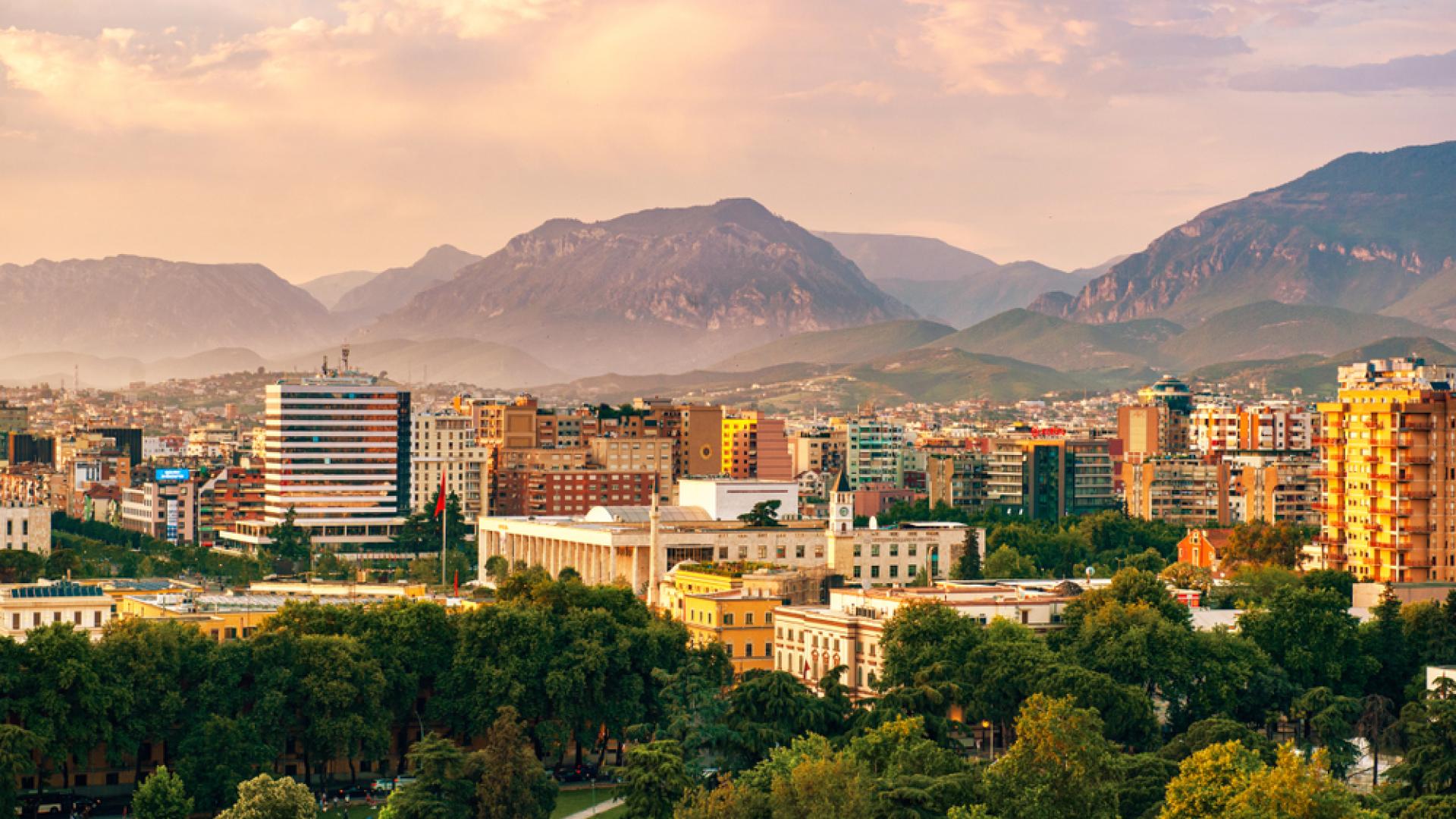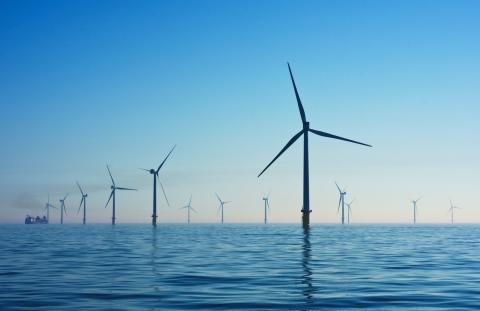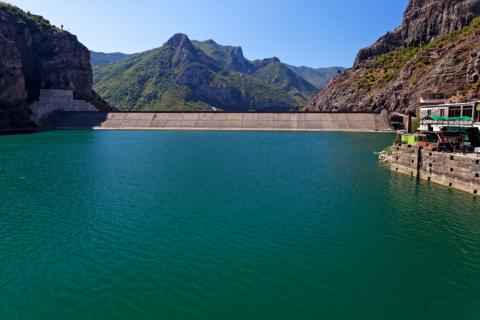Overview of the extractive industries
3.1 Exploration data
Requirement:
Fully met
90
The Secretariat’s assessment is that Albania has fully met the objective of ensuring public access to an overview of the extractive sector in the country and its potential, including recent, ongoing, and planned significant exploration activities. There is no evidence to suggest that there has been backsliding on Requirement 3.1, which was assessed as ‘satisfactory progress’ in the previous Validation.
6.3 Contribution of the extractive sector to the economy
Requirement:
Fully met
90
The Secretariat’s assessment is that Albania has fully met the objective
of ensuring a public understanding of the extractive industries
contribution to the national economy and the level of natural resource
dependency in the economy. There is no evidence to suggest that there
has been backsliding on Requirement 6.3, which was assessed as
‘satisfactory progress’ in the previous Validation. Albeiti provides data for
the extractive sector’s contribution to GDP, government revenues, and
exports. Additionally it provides employment data disaggregated by
gender, as well as providing an estimate of artisanal and small-scale
mining activities in the country, and the extractive sector’s contribution to
investments.
Legal and fiscal framework
2.1 Legal framework
Requirement:
Fully met
90
The Secretariat’s assessment is that Albania has fully met the objective of ensuring public understanding of all aspects of the regulatory framework for the extractive industries, including the legal framework, fiscal regime, roles of government entities and reforms. There is no evidence to suggest that there has been backsliding on Requirement 2.1, which was assessed as ‘satisfactory progress’ in the previous Validation. The level of fiscal devolution is clarified, though documentation is not provided as to how/where LGUs are awarded authority to impose taxes and fees (this issue is highlighted under EITI Requirement 4.6). MSG comments on the draft Validation report did highlight the relevant legislation, though the MSG could also ensure to cover this in EITI reporting. Additionally AlbEITI could improve on providing a precise indication of where applicable laws and regulations, identified in EITI reporting, are systematically disclosed.
2.4 Contracts
Requirement:
Partly met
30
The Secretariat’s assessment is that Albania has partly met the objective of this requirement to ensure the public accessibility of all licenses and contracts underpinning extractive activities. Significant aspects of the requirement have not yet been addressed: It remains unclear whether the full texts of all licenses, concessions and contracts awarded in 2021 are publicly disclosed. There is currently no clear government policy, though the MSG appear to deem the legal framework and practice conducive for comprehensive disclosure of the contents of future or current licenses and contracts. It appears that general practice is to (at least partially) publish production sharing agreements (PSAs) through the Official Gazette and mining licenses issued through the National Business Registry (QKB). Albeiti also appears to collate the most complete list of licenses that exists in Albania, but does not indicate what documents would constitute a comprehensive disclosure of appendixes, addendum or riders of a concession, contract or license. While Albanian stakeholders confirm their intention to publicly disclose the contents of concessions, contracts and licenses entered or amended from 1 January 2021, it still remains unclear (i) what the MSG considers as "the full text of different licenses, concessions and contracts, including any of their appendixes, addendum or riders", and (ii) whether Albeiti maintains a list of licenses, contracts or concessions that are publicly accessible at present. While MSG comments to the draft Validation report identified several companies that were awarded mining permits in 2021, the comments did not appear to address the two issues highlighted above. While Albeiti appears to maintain lists of active licenses and contracts, they do not appear to provide references to whether or (precisely) where the full text of these documents can be accessed, covering both the body of the contract and license as well as any annexes, amendments and riders where applicable. Lastly, Albeiti's workplan for 2021 references a study to explore the legal framework for contract or license disclosure, but the execution of this study remains unclear. Stakeholders from different constituencies did not seem to be aligned in whether this requirement’s objective is fulfilled.
6.4 Environmental impact
Not assessed
Requirement 6.4 is an encouraged aspect of the EITI Standard and is therefore not assessed in Validation unless there is evidence that the country has exceeded the requirement. Still, the Secretariat’s assessment is that Albania has met the objective of providing a basis for stakeholders to assess the adequacy of the regulatory framework and monitoring efforts to manage the environmental impact of extractive industries, and to assess extractive companies’ adherence to environmental obligations. The report clarifies the role of various government agencies, including requirements for extraction rights holders, and identifying AKBN as the agency assessing companies' compliance with environmental terms of licenses and concessions. However, the EITI Report does not strictly reference public documents where e.g. Environmental Impact Assessments, can be accessed. Still the MSG provided information about several reports including the annual National Environmental Monitoring Plan and specific forms for Environmental Rehabilitation requirements for companies. Albeiti also appears to have provided inputs to legal amendments with an emphasis on environmental considerations.
Licenses
2.2 Contract and license allocations
Requirement:
Mostly met
60
The Secretariat’s assessment is that Albania has mostly met the objective of providing a public overview of awards and transfers of oil, gas and mining licenses, the statutory procedures for license awards and transfers and whether these procedures are followed in practice. Progress has especially been made towards the corrective action from the previous validation with regards to describing the process for transferring or awarding licenses in the mining sector including the specific technical and financial criteria. Where licenses were awarded through a bidding process during the year under review in the mining sector, the government has also disclosed information on the list of applicants (including non-winning applicants) in accordance with Requirement 2.2 (c). This is despite perceived legal barriers to disclosure of non-winning bidders as documented by the IA. Albeiti, however, has not yet provided documentation of how the MSG assessed whether there are any non-trivial deviations in the allocation or transfer of licenses in the mining sector in accordance with requirement 2.2 (a) (iv), especially considering that the EITI Report was “not able to conduct an assessment”. No license allocations or transfers were made in the oil and gas sector in the year under review, also confirmed through MSG comments on the draft Validation report.
2.3 Register of licenses
Requirement:
Fully met
90
The Secretariat’s assessment is that Albania has fully met the objective of ensuring the public accessibility of comprehensive information on property rights related to extractive deposits and projects. There is no evidence to suggest that there has been backsliding on Requirement 2.3, which was assessed as ‘satisfactory progress’ in the previous Validation. Albeiti maintains a mining cadastre as well as a bi-annually updated mining license register and hydrocarbons license register. All datapoints required under Requirement 2.3 are disclosed by Albania online and systematically, except for date of license applications for many mining licenses and all oil and gas licenses, though in Albania’s second EITI validation the EITI Board took the view that the lack of publicly accessible dates of application was a marginal issue that did not affect Albania’s progress in meeting the overall objective of transparency in license information. This view is being retained in the current validation as well. It is to be noted that while the dates of expiry of mining and hydrocarbons licenses are not explicitly provided, these can be surmised from the dates of award, and duration of licenses which have been provided in the online license register for the mining and hydrocarbons sectors. In its comments to the draft Validation report, the MSG confirmed this possibility and Albeiti’s intention to provide this data in the future.
Ownership
2.5 Beneficial ownership
Requirement:
Mostly met
60
The Secretariat’s assessment is that Albania has mostly met the objective of this requirement to enable the public to know who ultimately owns and controls the companies operating in the country’s extractive industries. Most aspects of Phase I of beneficial ownership requirements have been addressed, in that BO data has been requested from all companies in Albania (not merely those holding and applying for extractive licenses). However, in the MSG’s assessment of comprehensiveness and reliability of BO disclosures, Albeiti does not reference publicly accessible information per company (only publishing their conclusions, not the underlying BO data). The MSG has also not assessed disclosures through the newly launched beneficial ownership registry of the National Business Centre (QKB). Albeiti does not appear to maintain a list of material companies’ legal or BO owners themselves at present. The Beneficial Ownership Register also appears to have some gaps in its beneficial ownership disclosures and does not indicate in any way which companies are publicly listed on (foreign) stock exchanges. While the register does include some BO information, it does not currently indicate whether beneficial owners are publicly exposed persons (PEPs), and current legislation does not appear to guarantee that all PEPs are indicated as BO for any company, regardless of their level of control. Legal ownership of extractive companies is disclosed by the QKB. Lastly, the EITI Report clearly indicates that there are no current verification methods or means by the government agencies, with the exception of penalties for failure to disclose or incorrect disclosures.
State participation
2.6 State participation
Requirement:
Fully met
90
The Secretariat’s assessment is that Albania has fully met the objective of the requirement 2.6, ensuring an effective mechanism for transparency and accountability for well-governed SOEs and state participation more broadly through a public understanding of whether SOEs’ management is undertaken in accordance with the relevant regulatory framework. Albpetrol is considered the sole SOE of the upstream extractive sector, given that the Hydropower sector is not covered by Validation. Additionally, two SOEs in the midstream sector are highlighted, though not material: Transnafta Sh.a. and Albgaz. State participation in Albpetrol gives rise to material revenues through Albpetrol’s payments of dividends to the state as its sole shareholder. These payments are determined on the same terms as private companies, and through its sale of the state’s in-kind revenues. The 2017-2018 EITI Report clarifies the rules and practice related to Albpetrol’s ability to raise third-party financing and document the changes in state participation in the year under review. On the practice of SOE governance, the EITI Report draws from the publicly available audited financial statements of Albpetrol to document two loans from private banks to Albpetrol. The 2017-2018 Report also notes the absence of state loans to private companies in the mining, oil and gas sector including (the lack of) state guarantees.
4.2 In-kind revenues
Requirement:
Fully met
90
The Secretariat’s assessment is that Albania has fully met the objective of this requirement to ensure transparency in the sale of in-kind revenues of minerals, oil and gas to allow the public to assess whether the sales values correspond to market values and ensure the traceability of the proceeds from the sale of those commodities to the national Treasury. The 2017-2018 EITI Report provides volumes collected, volumes sold and sales proceeds for both the share of oil production under PSAs as well as Albpetrol’s equity oil. Disaggregation between equity and profit share of production does not occur. Albpetrol also systematically discloses each sale and auction process on its own website. Compared to the previous Validation, the sales are not disaggregated by cargo anymore, which is encouraged, though there is no evidence to suggest that there has been backsliding on required aspects Requirement 4.2, which was assessed as ‘satisfactory progress’ in the previous Validation.
4.5 SOE transactions
Requirement:
Fully met
90
The assessment of the Secretariat is that Albania has fully met the objective of the requirement 4.5, ensuring the traceability of payments and transfers involving SOEs and strengthen public understanding of whether revenues accruable to the state are effectively transferred, as well as the level of state financial support for SOEs. There is no evidence to suggest that there has been backsliding on Requirement 4.5, which was assessed as ‘satisfactory progress’ in the previous Validation. There might be scope for replicating additional details covered on hydropower SOE transactions to be published for the petroleum sector as well. This would be increasingly important as EITI reporting begins to cover the flows from Albania’s gas transportation SOE, Albgaz. The level of progress in addressing this requirement have been maintained since the previous Validation.
6.2 Quasi-fiscal expenditures
Not applicable
Production and exports
3.2 Production data
Requirement:
Fully met
90
The Secretariat’s assessment is that Albania has fully met the objective to ensure public understanding of extractive commodity(ies) production levels and the valuation of extractive commodity output, as a basis for addressing production-related issues in the extractive industries. The methodology for estimating production values is based on export sale prices. While comments from the MSG to the draft Validation report implied that there could be missing commodities from the published data, Albeiti's data portal does include data on the highlighted commodities. Thus, there is no evidence to suggest that there has been backsliding on Requirement 3.2, which was assessed as ‘satisfactory progress’ in the previous Validation.
3.3 Export data
Requirement:
Fully met
90
The Secretariat’s assessment is that Albania has fully met the objective to ensure public understanding of extractive commodities export levels and the valuation of extractive commodity exports, as a basis for addressing export-related issues in the extractive industries. The Report notes however that 10% of mineral exports came from companies that did not hold mining permits. There is no evidence to suggest that there has been backsliding on Requirement 3.3, which was assessed as ‘satisfactory progress’ in the previous Validation.
Revenue collection
4.1 Comprehensiveness
Requirement:
Mostly met
60
The Secretariat’s assessment is that Albania have mostly met the objective of ensuring comprehensive disclosures of company payments and government revenues from oil, gas, and mining as the basis for detailed public understanding of the contribution of the extractive industries to government revenues. The level of progress in addressing this requirement have been maintained since the previous Validation, i.e. without significant improvements.
In determining material revenues and companies, it does not appear the MSG has made progress on the corrective action from the 2019 Validation to reconsider materiality thresholds for selecting mining companies. The methodology appears to be unchanged since last Validation, and the report indicates that no thresholds were used for determining material flows [revenues].The International Secretariat also cannot conclude that the government in Albania provides a full government disclosure of revenues from the extractive sector by individual revenue stream. The EITI Report states that it does not provide full government disclosure, and multiple revenue streams appear to have been excluded seemingly without consideration of their individual total values. Mining companies continue to be selected based on production, without a per-company breakdown of companies’ contribution to government revenues, followed by an ex-post confirmation only determined for a single revenue stream. Given that 31 of 137 companies did not report, this remains a significant challenge for determining the comprehensiveness of reporting, in combination with uncertainties related to full government disclosure of revenues. Lastly, two government entities did not report for either 2017 nor 2018; Ministry of Finance and Economy (MFE) and the Ministry of Tourism and Environment (MTE).
4.3 Infrastructure provisions and barter arrangements
Not applicable
The Secretariat’s assessment is that Requirement 4.3 remains 'Not Applicable' in Albania in the period under review. The level of progress in addressing this requirement have been maintained since the previous Validation, though the MSG is advised to re-confirm its non-applicability annually, through the EITI reporting process.
4.4 Transportation revenues
Not applicable
The Secretariat’s assessment is that Requirement 4.4 remains 'Not Applicable' in Albania in the period under review. The level of progress in addressing this requirement have been maintained since the previous Validation, though the MSG is advised to re-confirm its non-applicability annually, through the EITI reporting process.
There are no SOEs or government agencies regulating the transportation of minerals, and though the EITI Report identifies some companies and public-private partnerships (PPP) in the midstream petroleum sector (oil and gas transportation), stakeholder consultations confirm that any such arrangements were inactive or under development during the period under review. The SOE Transnafta Sh.a. was inactive during the period, and while Albgaz was subject to gas transportation tariffs set by ERE, it was not operational during the 2017-2018 period. A PPP arrangement involving La Petrolifera Italo-Albanese Sh.a. (PIA), indicates and descriptions of the Trans Adriatic Pipeline (TAP) indicate there were no remunerations to the Government of Albania in 2018.
4.7 Level of disaggregation
Requirement:
Mostly met
60
The Secretariat’s assessment is that Albania have mostly met the objective of this requirement to ensure disaggregation in public disclosures of company payments and government revenues from oil, gas and mining that enables the public to assess the extent to which the government can monitor its revenue receipts as defined by its legal and fiscal framework, and that the government receives what it ought to from each individual extractive project. The level of progress in addressing this requirement have been maintained since the previous Validation, i.e. without full incorporation of the requirement’s new aspects.
The EITI reporting highlights significant challenges for government systems to publish revenue data disaggregated by revenue stream, company and government entity, due to issues of prior consent of licensees for the disclosure of tax and customs data. However, the EITI Report does disaggregate data for those companies that provided consent to such publication. In terms of project-level reporting (PLR), Albania applies definitions of projects in line with the EITI Standard; a single Petroleum Agreement for the oil and gas sector and "each license " for mining sector. Royalties are the only revenue stream deemed to be imposed at project levels. However, there are also substantial challenges related to PLR due to mining companies holding multiple licenses, though government systems only recording per unique company ID. Stakeholder consultations do imply that AKBN, or other agencies than the General Tax Administration, receive regular declarations from license/concession/contract holders on a per-project basis, which may reveal a potential for project-level reporting through government systems. Regardless, Albeiti sought to collect PLR data from companies to overcome this issue, to which it has been partially successful. The data provided through Validation templates and in the 2017-2018 EITI Report so far does not indicate that Albania comprehensively reports data per project, in line with Requirement 4.7 of the EITI Standard.
4.8 Data timeliness
Requirement:
Fully met
90
The Secretariat’s assessment is that Albania has fully met the objective of ensuring that public disclosures of company payments and government revenues from oil, gas and mining are sufficiently timely to be relevant to inform public debate and policy making. There is no evidence to suggest that there has been backsliding on Requirement 4.8, which was assessed as ‘satisfactory progress’ in the previous Validation.
4.9 Data quality and assurance
Requirement:
Mostly met
60
The Secretariat’s assessment is that Albania has mostly met the objective of ensuring that appropriate measures have been taken to ensure the reliability of disclosures of company payments and government revenues from oil, gas and mining. The aim is for the EITI to contribute to strengthening routine government and company audit and assurance systems and practices and ensure that stakeholders can have confidence in the reliability of the financial data on payments and revenues. The level of progress in addressing this requirement have been maintained since the previous Validation, i.e. without significant improvements.
Statutory audit procedures are clear in the EITI Report. However, no government entity or state-owned enterprise (SOE) submitted their audited financial statements or reports to the Independent Administrator (IA) for 2018, and only 25 companies published results of external audits, without information broken down per reporting company. The report indicates that only 45% of reconciled revenues were audited in 2018 (42% of oil & gas, 8% of mining and 89% of hydropower). Furthermore, the report highlights that the MSG did not opt for a different method in assessing assurances related to the 2017-2018 reporting process and contest that they followed the Standard TOR for Independent IAs. The EITI Report does not clarify how the MSG influences the design of reporting templates, citing an outdated template approved in 2011, with an additional template for beneficial ownership data (see Requirement 2.5). MSG comments on the draft Validation report appears to provide examples of how reporting is discussed and decided by the MSG, by submitting extended MSG meeting minutes for 27 July 2021. The meeting minutes and MSG comments clarify that these issues are under discussion though the MSG have not reached a clear decision on additional assurances and/or reporting templates. The outcome of these discussions should be reassessed in future Validations.
The EITI Report provides multiple, and at times contradictory assessments of comprehensiveness, though does not provide an explicit conclusion on the reliability of EITI data. Even when given the limitations above, it does not affect the MSG’s view of the comprehensiveness of the EITI Report. Assessments are included per individual revenue stream, even if contradicting other limitations on total extractive revenues (see Requirement 4.1). Lastly, limitations of providing an ex-post verification of the company selection reveal that comprehensiveness is only assessed towards a single revenue stream, not towards total coverage.
Revenue management
5.1 Distribution of revenues
Requirement:
Fully met
90
The Secretariat’s assessment is that Albania has fully met the objective of ensuring the traceability of extractive revenues to the national budget and ensuring the same level of transparency and accountability for extractive revenues that are not recorded in the national budget. There is no evidence to suggest that there has been backsliding on Requirement 5.1, which was assessed as ‘satisfactory progress’ in the previous Validation. All of Albania’s mining revenues are recorded in the national budget, alongside 72% of the oil and gas revenues. Extractives revenue streams that are not recorded in the national budget mainly consists of Albania’s Share of Oil Production and Bonuses that are received by Albpetrol, with its financial statements available online. The report also identifies AKBN as collecting and retaining a minor portion of oil and gas revenues in 2018 (bonuses).
5.3 Revenue management and expenditures
Not assessed
Progress in addressing Requirement 5.3 is not assessed in Validation unless there is evidence that the country has exceeded the requirement. The Secretariat’s assessment is that Albeiti have met the objective of strengthening public oversight of the management of extractive revenues, the use of extractives revenues to fund specific public expenditures and the assumptions underlying the budget process. There is no evidence to suggest that there has been backsliding on Requirement 5.3, which was assessed as ‘satisfactory progress’ in the previous Validation.
Subnational contributions
4.6 Subnational payments
Requirement:
Mostly met
60
The Secretariat’s assessment is that Albania has mostly met the objective of enabling stakeholders to gain an understanding of benefits to local governments through transparency in companies’ direct payments to subnational entities and strengthening public oversight of subnational governments’ management of their internally generated extractive revenues. Albania established that six reporting LGUs were material based on production and subnational transfers of royalty. However, some subnational payments to LGUs are reported by companies under “Other Payments made to the LGU”, not per revenue stream, though only partially and with delays and discrepancies (2017-2018 Albania EITI Report at pp.186-187). The EITI Report (p. 152) as well as the Albeiti MSG confirm most of the payments to the LGUs are local taxes unrelated to the extractives sector. Still, Albania’s progress does not address the corrective action of the EITI Board, that the MSG should undertake appropriate scoping of direct subnational payments by extractive companies to LGUs, establishing a comprehensive basis for the MSG’s materiality discussions regarding direct payments to LGUs. MSG comments to the draft Validation report clarify the precise law which awards LGUs with the mandate to impose local taxes and fees (see Transparency template attached to this Validation report), though does not clarify the value of each LGU’s revenues in accordance with the law in the period under review. Other recommendations on Requirement 4.6 have also not been fulfilled, to ensure all extractive payments to subnational government units, when material, be disclosed and reconciled, and to publicly disclose a detailed explanation all types of local payments. The prevailing scenario brings to question the comprehensiveness of reporting sub-national direct payments in Albania.
5.2 Subnational transfers
Requirement:
Fully met
90
The Secretariat’s assessment is that Albeiti has fully met the objective of enabling stakeholders at the local level to assess whether the transfer and management of subnational transfers of extractive revenues are in line with statutory entitlements. There is no evidence to suggest that there has been backsliding on Requirement 5.2, which was assessed as ‘satisfactory progress’ in the previous Validation. While the process of allocation of 5% royalties to the LGUs is done by the Directorate of Local Finances in the Ministry of Finance and Economy, the actual transfers are executed by the General Directorate of Taxes through the government’s single treasury system. The 2017-2018 Albania EITI Report describes statutory subnational transfers of royalties, provides the general formula, and budgeted and actual transfers for 2017 and 2018. However, Albeiti stops short of specifying the budgeted subnational transfers disaggregated by LGU, nor compare any strict 5% calculation of royalties that should have been distributed per LGU. This prevents the assessment of any discrepancy between the budgeted and actual amount transferred, disaggregated by LGU. This was accepted by the EITI Board as sufficient in their previous Validation, and Albania’s progress towards this requirement has been maintained. Additionally, as part of MSG comments on the draft Validation report, a recent development of 2021 is the opening of a dedicated account in the Unified Treasury System: 7204100 “Local Unit Grants from the Participation in the royalty tax”. While the comments do not influence the assessment of fully met, the comments indicate that government systems will improve further on its monitoring revenues earmarked for subnational transfers from mineral royalties collected in 2022 onwards.
6.1 Social and environmental expenditures
Requirement:
Mostly met
60
The Secretariat’s assessment is that Albania has mostly met the objective of enabling public understanding of extractive companies’ social and environmental contributions, and providing a basis for assessing extractive companies’ compliance with their legal and contractual obligations to undertake social and environmental expenditures. The level of progress in addressing this requirement have been maintained since the previous Validation, i.e. without full incorporation of the requirement’s new aspects.
Social payments are not mandatory in Albania, but the EITI Standard 2019 also cover environmental payments to government. Environmental payments are mandated by law and as reported in the EITI Report 2017-2018, made to the Ministry of Tourism and Environment (MTE), and are classified as environmental/social expenditures. Therefore, while social payments may be excluded from the purview of reporting, the materiality of environmental payments must be assessed. Aggregate environmental payments by revenue stream for all sectors (and not just extractives) are directly disclosed online by Albeiti and are available at: http://www.instat.gov.al/en/themes/environment-and-energy/environmental-accounts/. For the year under review 2018, these payments amounted to Albanian Lek 51,146 million. This total amount far exceeds the materiality thresholds established by Albeiti for reporting its extractives revenue streams. Although it is unclear how much of these environmental payments are attributable to extractive industries, it raises the possibility that they might be material. However, the Albeiti MSG has not discussed the materiality of these payments. The fact that the universe of government revenues has not been disclosed in accordance with Requirement 4.1 further complicates such calculation.
Stakeholder consultations during validation revealed that some of these environmental payments may be substantial for mining exploration companies. As another example, while the Albania 2017-2018 EITI Report discloses carbon tax for the oil, gas and mining sectors (tables 14 and 23), it is akin to an excise duty in Albania (See also: The United Nations Economic Commission for Europe’s (UNECE) third environmental performance review of Albania at p.37). The Albeiti MSG has not discussed whether it has considered carbon tax or other environmental payments as material environmental payment. MSG comments on the draft Validation report confirmed that there are mandatory environmental payments to be paid by extractive companies, though the precise type of tax and mode of calculation remains unclear.









